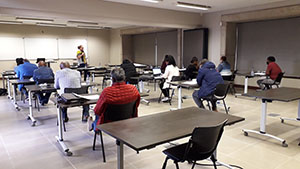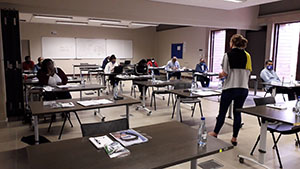Numerous stories of unscrupulous training provider behaviour have emerged against a struggling economy. This includes, for example, call centres selling courses that do not exist to a one-man training provider who has a few years’ experience in a particular subject and a Zoom package.
What can you do to find out if the CPD course you have chosen to spend your very scarce commodity money and time, is legit and is not a bogus training provider?
Rule #1 - Ask the right questions and do your homework long before paying the registration fee.
Step 1: Consider the provider
- Find out if the training provider has a good reputation and if it is an industry specific provider. Accreditation by a well-known body helps not only to raise the profile and value of the provider but also for the courses they run.
- Does the training provider offer additional credentials and accreditations?
- Does the training provider offer student support services after the course?
- Do not just go for the cheapest courses for the required CPD points for professional re-registration. Not all training providers and courses are equal, so be willing to compromise as you will get what you pay for.
Step 2: CPD Validation Certificate
- Ask the training provider to send you the CPD certificate and if they say its pending or do not have one, do not register for the course until they can send you the CPD certificate. Just because it has been sent for CPD validation does not mean the course is going to get approved for CPD points/credits.
- Check that the CPD validating organization for the relevant course is an approved CPD Licensed Body with the Engineering Council of South Africa (ECSA)
- If you get sent a CPD validation certificate, check the expiry date, its normally displayed in the CPD validation numbers i.e. CESA-9999-06/2022. This means that this ‘CESA’ CPD course validation expires in ‘June’ ‘2022’. Each ECSA approved CPD Licensed Body might do something similar or slightly different with their validation numbers.
Step 3: Do not be afraid to contact the training provider and ask numerous questions about the training company and trainer.
- Always phone the company, yes phone, and confirm the following:
- Do they answer the phone with the correct training company name? If you battle to get through to the company, it is a very big red flag. It often means that they may not have offices and therefore not traceable.
- Ask how long their company has been in the training business.
- Ask for the trainers’ CV and/or profile so you can check out the trainer’s background. Once received, check the trainer’s industry and technical experience, including their qualification, and relevant training experience.
- Phone a few days before the time to check if the advertised trainer is still presenting the course. It is a red flag is the trainer has been substituted.
- Ask the training provider to send you an example of the course’s CPD certificate (PDF) that the delegate will receive. Check if the training providers company name is on the delegate certificate, is the same as on the CPD validation certificate. The delegate’s certificate cannot have a 3rd party’s company name on the CPD validation certificate, even if it is the trainer’s name or company.
- Check the training provider has a website and does it look professional.
- Is the contact information professional? If there is a Gmail / Hotmail / Yahoo account, this provider must be avoided!
- Can you find the course outline for each training course offered? If not, they are most likely trying to attract enquiries and leads on courses they do not actually provide.
- Do any of the page links lead to Error messages?
- Can you clearly see the price for each course? Or do you have to contact them to find out? A professional training provider is transparent about their pricing.
- Does their website, including course brochures, have spelling mistakes – training providers are in the business of education, there is no excuse for shocking spelling mistakes, grammatical errors, or formatting disasters.
Step 4: Read the Terms and Conditions (read the small print)
Payment is on registration and most training providers never give refunds, regardless, if the delegate is cancelling in the prescribed time or the training provider postpones the course. The training provider will however issue a credit training voucher validated for a fixed period (mostly one year). Sometimes the course never runs again, and the delegate might not be interested in the other courses that the training provider has to offer, but still there will be no refund.
Step 5: Report bad training or unsatisfactory service of the training provider with the organization that CPD validated the training provider and the course.
Above all, a professional CPD training provider will be able to demonstrate their reputation in the industry. They will endeavour to uphold the professional aspect of your development not only by the courses they offer, but by the outcomes that they deliver. Making a good match of these to the outcomes you desire, and you are well on the way to finding the right CPD course for you.
Why Choose to train with the School of Consulting Engineering (SCE):
- CESA’s brand is reputable in the industry, and therefore the School of Consulting Engineering, is the trusted training provider in the Built Environment.
- The School of Consulting Engineering under the auspices of CESA, is an approved ECSA and SACPCMP voluntary association, with a member base across the country totalling more than 580 consulting engineering firms.
- Our SCE training programme consists of short courses, seminars, and workshops, that enable professionals to gain Continuing Professional Development (CPD) points/credits with ECSA and some courses with the SACPCMP.
- The SCE has reputable trainers with specialised knowledge, skills, and experience. The trainers are subject matter experts in their field with extensive track records.
- Our extensive SCE course catalogue features only the highest-quality ECSA CPD validated courses, covering a wide variety of industry specific subjects, which are claimable on your BBBEE scorecard.
- The SCE has 25 different trainers and over 86 CPD validated courses, developed to meet the specific requirements of the engineering and construction industry.
- Our SCE online training courses are just as effective as the classroom experience were multiple delegates, who are situated either at their office or at their home, are trained in real-time but keeping “social distancing” a priority.
- The SCE has been presenting face to face (classroom) courses for over 20 years.
- Our success in delivering in-house training courses is attributed to our ability to work closely with your organisation in understanding your goals and specific requirements.
- The SCE is registered as a vendor with most municipalities, local authorities, government, and State-ewned enterprises.
- Our flagship one-year programme, entitled the Business of Consulting Engineering Development Programme (BCE), develops future consulting engineers into industry leaders in the consulting engineering environment.
To find out more please visit www.cesa.co.za/sce
|





![]()

![]()






